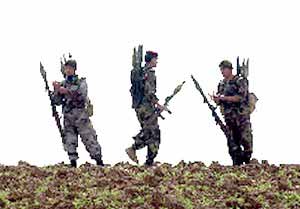Hoshyar Zebari, a leading member of the ruling Kurdistan Democratic Party, said the seizure of the installation about 10 miles northeast of Mosul meant no Iraqi defenses remained between Kurdish-U.S. forces and Iraq's third-largest city. He said there had been little resistance to the ground assault, suggesting "the demoralizing situation of the Iraqi army." "From our perspective it was the most important gain ... so far," Zebari said. "This shows the crumbling of the northern front." The mountain rises steeply from the plain where Mosul sits. An Assyrian Orthodox monastery dating from the 4th Century is built into the rock. Small buildings reduced to rubble and twisted wreckage of what was an important Iraqi radar and communications hub showed the effectiveness of the air strikes. Dozens of Kurdish soldiers, exhausted from the night's fighting, rested on the ground, cradling their rifles in their arms and using their scarves to protect their faces from a fierce wind. Kurdish commander Sarbest Barbiri said there were believed to be some Republican Guard remnants and Fedayeen militiamen defending Mosul, but that the regular army was defeated or had given up. "This was the place where Saddam's forces looked down on Mosul. Now we are looking down on what's left of Saddam's army," said Barbiri. Zebari said control of the peak will allow passage for people wishing to escape the embattled city, which has been repeatedly targeted in coalition air strikes. He stressed that there would be no unilateral Kurdish move, saying the operation was being coordinated with the Pentagon. Kurdish forces have also tightened their ring around the key oil center of Kirkuk, and were within sight of the city Tuesday following heavy coalition airstrikes on front-line Iraqi positions. Control over the northern cities of Mosul and Kirkuk and the oil fields between them is the main objective of the northern campaign to topple Saddam. Kurds consider both cities part of their historical ethnic territory. In spontaneous demonstrations of joy, people in the Kurdish city of Irbil ran into the streets, and drivers and bicyclists beeped their horns. The cars flew flags and scarves in yellow, the color of the governing Kurdistan Democratic Party in the western sector of the Kurdish autonomous zone. A group of young boys held aloft an American flag with a picture of Sylvester Stallone emblazoned on the middle. A man riding in the back of a pickup truck flashed a V for victory sign as he passed. Kurdish fighters, piled onto a city police truck, waved their weapons in a victory gesture. In Sulaymaniyah, in the eastern part of the Kurdish autonomous region, hundreds of people, most of them young, celebrated outside the hotel where most foreign journalists stay. They swarmed around a square near the hotel, chanting "George Bush!" "George Bush!" They said Saddam had already fallen, and waved American flags, Kurdish flags and Iraqi flags. "Now that Saddam is going, there's no more difference between Iraqis and Kurds," said Bakir Mohamad, a 19-year-old agriculture student. A little girl wearing the bright red and yellow traditional Kurdish dress stood up in the sunroof of her parents' car, waving a napkin. When U.S. special operations troops drove past the demonstration, people cheered and others reached into their car and hugged and kissed them. Coalition warplanes have repeatedly bombed targets in northern Iraq, but the advance of ground forces has been slow, in part because of sticky regional politics. The arrival of U.S. forces in Baghdad, however, may signal a more aggressive northern campaign. The estimated 70,000 Kurdish fighters in the region have insisted they are ready any time. The Pentagon originally planned to send up to 60,000 ground troops into the Kurdish zone from Turkey to squeeze Baghdad from two directions. But anti-war sentiment in Turkey persuaded its parliament to reject Washington's proposal. Turkish leaders object to any Kurdish move on Kirkuk, Iraq's No. 2 oil region. Turkey worries that stronger and richer Iraqi Kurds could fuel aspirations for independence among Kurdish groups elsewhere - especially Kurds in Turkey. With air the only option, about 1,200 U.S. paratroopers dropped into northern Iraq on March 27 to join the special forces already in the region. More soldiers have been sent, but so far, coalition strength in the region has been too limited to launch serious ground assaults against the heavily defended cities. Saddam's regime has long oppressed the 4 million Kurds living in northern Iraq. In the late 1980s, Saddam opened a massive campaign against the Kurds that left tens of thousands of people dead or displaced, including an estimated 5,000 victims of a 1988 poison gas attack on Halabja. Since the end of the first Iraq war, U.S.- and British-enforced no-fly zones over Kurdish territory have prevented Saddam from reclaiming the area. In recent years, the Iraqi government has expelled thousands of Kurds from the oil-rich Kirkuk area and settled Arabs in their place. As many as 120,000 Kurds have been forced from their homes since 1991, Human Rights Watch reported.
|
